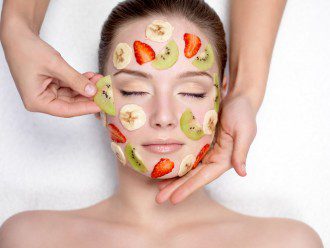20th May 2016
By Marie Be
Guest Writer for Wake Up World
Proper skin care is important, since the skin is the bridge between the outside and the inside of the body. What you put on your skin gets directly absorbed into your body; put toxins on your skin, and you body will take the toll. For this reason, avoiding toxic products from the cosmetic industry and instead using food-grade ingredients on our skins has become the routine of many (for more info, please see Skin Science – Debunking Cosmetic Industry Propaganda).
But what about our diet? Can a toxic diet directly cause skin ailments? The answer is simple: Yes. To alleviate skin troubles, it is not enough to look at what we put onto our skin but also what we put into our bodies.
[pro_ad_display_adzone id=”110028″]
The skin is the major detoxification organ of the body. If your skin is not as radiant as it could be, it is probably because it is busy processing the toxins absorbed from diet and environment. For example, why would one suffer from eczema and not their partner, although they both have the same diet? The skin of individual suffering from eczema is doing a better job at excreting toxins from the internal body, which causes eczema. It is a mixed blessing.
There are many things you can do give your skin the best nutrients so it can be radiant and healthy.
First, remove the worst offenders from your diet. Cut down toxins by avoiding processed foods, refined sugar, cows dairy, poor quality animal proteins, sodas, or refined salt. It’s the acidic toxins that are causing skin problems. An acidic body makes your skin scream for help. It’s also wise to avoid foods that might inflame your skin further. What is inflammatory to your body will be entirely different to what might irritate someone else’s body. However, there are some foods which are best treated with caution if you are suffering. These include all processed foods, refined sugars and starches, chocolate, dairy, wheat, tomatoes, citrus for some people, and soy products. If you are consuming a lot of any of these foods, try eliminating them for a week and see if there is a noticeable difference in how you feel and your skin quality.
Alkaline, hydrating food and drinks come first. Make sure that the majority of your diet is high quality, alkaline-forming whole foods. Aim for at least 60% alkaline foods and drinks if you are very new to a clean diet, and at least 80% alkaline foods and drinks if you are already eating a fairly healthy diet. This mean to focus on the fresh food, particularly fresh vegetables. They will make your body alkaline so that the acidic toxic matter in your body is drawn out and neutralized. (For more info on the benefits of an alkaline diet, please see: Striking the Balance: Why Optimal Body pH Matters and How to Achieve It.)
For an alkaline body, fresh vegetable juice is the best tonic for your skin. A delicious juice combination is 1-2 cucumbers, a few stalks of celery, a lemon, a small piece of ginger, a beetroot, 2 green apples and a big handful of spinach. Add in some fresh salads, avocados and a little fresh fruit and you have an awesome alkaline base. And don’t forget about the soaked (and ideally fermented) raw nuts and seeds, lightly cooked vegetables and lots of coconut oil. Watch out to not over-indulge in fruits and their natural sugars. While natural sugars in fruit and sweeteners like pure maple syrup and molasses have a lot of great nutritional properties, they are not great foods for someone with skin problems.
If you are suffering from regular acne breakouts or rashes, there is a very good chance you have an overgrowth of yeast in your body and your guts bacteria is out of balance. Sugar in any form, even in fruit, feeds yeast and throws this bacterial balance out even further. Focus on low sugar fruits like green apples, berries, grapefruit, lemons and limes. Skin issues are often eased just by taking a really high quality probiotic to help replenish the good bacteria in the gut, and to help ensure the balance of yeast and “bad” bacteria stay under control. You can purchase them in pill form, or enjoy foods naturally rich with beneficial yeast and bacteria, like raw cultured vegetables, coconut kefir, unpasteurized kombucha and other fermented foods. You can also take some anti-fungal supplements such as Oil of Oregano or Olive Leaf Extract to re-balance your digestive system. Finally, drinking a teaspoon of zeolite in a big glass of clean water, once or twice a day, will also help re-establish a healthy bacterial balance and alkalinize the body. (For more info on bacterial balance, please see this article.)
There are also many foods that have particular benefits to the health of the skin:
Foods for Better Skin Health
Vitamin A
Vitamin A is a vital nutrient for maintaining vibrant skin. It helps the body produce collagen, an important protein that’s partly responsible for skin’s youthful elasticity. It also helps protect against collagen deterioration. It is also an essential vitamin required for vision, gene transcription and boosting immune function. Carrots, sweet potatoes, dark leafy greens, squash, apricots, melon, red peppers and mango are all foods high in vitamin A.
Salmon
Fish is an excellent source of lean protein. Cold water fish species like tuna, swordfish, or salmon are superb sources of natural omega-3 fatty acids. Fatty acids in a diet can help fight the damaging effects of ultraviolet radiation on sun-exposed skin. As a bonus, wild salmon contains a potent antioxidant pigment called astaxanthin, which may fight wrinkles and sagging (1).
Nuts
The body needs healthy oils for healthy skin. The fats serve as the building blocks for the sebaceous glands (the oil producing glands in the skin). These natural secretions reduce dryness and form a protective barrier, our first line of defense against the outside world. Polyunsaturated omega-6 oils are especially important. Unfortunately, most Americans consume poor quality refined omega-6 oils from corn and soy. These oils are frequently rancid from extended storage and may have residues from chemical solvents. The optimal way to consume your omega-6 fatty acids is from whole foods. Raw nuts and seeds are one of the richest sources of omega-6 oils. They are also a natural source of vitamin E which is extremely beneficial for the skin. In addition, nuts are packed with fiber and healthy phyto-chemicals like plant sterols which aid in detox and improve digestion.
Whole Grains
Unlike refined flour or polished white rice, whole grains offer far more than simple carbohydrates. The fiber in whole grains is great for the digestive tract, but whole grains are also an excellent source of skin-friendly B vitamins like folate, niacin, and micronutrients like zinc and magnesium. Zinc is especially important for skin’s immune defenses.
Turmeric
Turmeric is the source of potent chemicals collectively known as curcumin. Curcumin reduces inflammation and works as an antioxidant to reduce skin damage. Ongoing research shows that curcumin helps helps fight melanoma when applied topically. It also might work to thwart the progression of an increasingly common skin cancer, squamous cell carcinoma (2).
Foods High in Vitamin C
Collagen is the main protein that forms the foundation of our skin. Age, sun damage and poor circulation can weaken collagen and lead to sagging skin, wrinkles and poor wound healing. Vitamins C is a vital cofactor in the synthesis of collagen and it is well known that vitamin C deficiency leads to skin weakness and damage. It has been shown that dietary consumption of vitamin C will raise the concentration of vitamin C in the skin. Most people associate vitamin C with citrus fruits like lemons and oranges. But ounce for ounce, kiwi is an even more potent source of this crucial antioxidant. Papaya, guava, strawberries, lime, oranges, kiwi, broccoli and peppers are also high in vitamin C. Vitamin C is essential for maintaining connective tissue. Kiwi, are all excellent sources of collagen-sparing vitamin C. Prolonged cooking can destroy vitamin C, so fruits and veggies need to be raw or lightly cooked to be a good source.
Olives and Olive Oil
Extra virgin olive oil is a nutritional superstar. Praised for its heart-healthy mono- and polyunsaturated fats, it also contains unique antioxidant phytochemicals, or chemicals found naturally in plants that may improve your health.
While scientists are still investigating the numerous benefits of olives and extra virgin olive oil, residents of the Mediterranean region have been enjoying the benefits of this skin-friendly oil for centuries. Enjoy it in food or apply directly to the skin for the treatment of atopic dermatitis.
Coffee and Tea
Although there may be many reasons to avoid caffeine, healthy skin is not one of them. Studies show that people who regularly drink coffee and green tea have lower rates of skin cancer. Green tea also protects against the premature aging caused by sun exposure. Green tea has a high concentration of catechins, which have strong anti-inflammatory, antioxidant, and anti-aging effects on skin. Both coffee and tea are packed with antioxidants. The actual caffeine and theine may also be beneficial, ast it may increase circulation. Don’t worry if caffeinated beverages are not for you. You can use the caffeine and tannins present in these beverages topically to constrict blood vessels, tightens skin and reduces puffiness. Make sure you get your coffee and tea from an organic source, as the inorganic kinds are often high in toxins.
Cinnamon
Cinnamon adds a kick to cookies and hot drinks, but it’s also packed with antioxidants – substances that fight skin damage. Cinnamon has more antioxidant value than half a cup of blueberries (3). For an easy antioxidant boost, sprinkle half a teaspoon of cinnamon on your coffee grounds before brewing.
Hot Peppers
Hot peppers like chili, paprika, cayenne, and jalapeño do more than put your taste buds on alert – they also defend your skin. Vitamins A and C in peppers help combat free radicals, preventing the breakdown of collagen to maintain the integrity of our skin. The colorful peppers also contain capsaicin, which acts like a sunscreen to shield skin from damage caused by UV rays.
Final Thoughts
Remember, the skin is a bridge between the internal body and the external environment. What gets applied the skin affects its health, as well as the health of the body. The opposite is also true. What you eat affects the health of the body, and the vitality of the skin. For more information or to find organic products improving skin health, checkout EarthSun.
References:
- American Journal of Clinical Nutrition. 2013 Mar;97(3):646-52.
- Clinical Cancer Research. Curcumin Suppresses Growth of Head and Neck Squamous Cell Carcinoma. October 1, 2005 11; 6994.
- Keri Glassman, author of The O2 Diet.
- Marti Wolfson, culinary director at Blum Center for Health in Rye Brook, N.Y.
Previous articles by Marie Be:
- How GMO Foods Turn Your Intestines Into a Pesticide Factory
- How to Detox the Body of Heavy Metals and Avoid Common Exposures
- Preventative Detox: 6 Foods to Avoid for a Clean Healthy Body
- BURN: Health Impacts of Sunscreen Found to be Worse Than UV Damage!
- Natural Detox : Flush Your Toxins Down the Drain
- Easy Home Recipe: Skin and Body Detox Cream
- Skin Science – Debunking Cosmetic Industry Propaganda
- 3 Years After Fukushima: Behind the Skewed Data and Vested Interests
- How Modern Symptom-Based Medicine Can Make the Sick, Sicker
- Heavy Metal Toxicity Can Ruin Your Health
- Forgotten Knowledge: Natural Skin Care for Your Baby
About the author:
 Marie Be’s inspiration comes from her mom who always challenged common assumptions and sought to understand for herself the major issues concerning her family and the choices she made on their behalf. She raised Marie and her brother in a rural environment, feeding them the best organic foods, and focused on building strong immune systems in her children through the use of natural plants, herbs and minerals.
Marie Be’s inspiration comes from her mom who always challenged common assumptions and sought to understand for herself the major issues concerning her family and the choices she made on their behalf. She raised Marie and her brother in a rural environment, feeding them the best organic foods, and focused on building strong immune systems in her children through the use of natural plants, herbs and minerals.
As a fiery teenager, Marie travelled the world in search of purpose and dreamed of positively influencing our society. While earning her first two degrees, in architecture and sustainable development, she worked for Greenpeace and many other organizations of change. Her experience taught her that change cannot be imposed; she now aims at inspiring individuals through education and awareness.
Marie moved to Vancouver to undertake a Masters in Regenerative Sustainability under the supervision of a Nobel Peace Prize recipient. Teaching workshops on well-being, she started observing a widespread desire in our society for both physical and environmental health and sustainability. Feeling the winds of change, Marie founded Earth for the Sun.
Earth for the Sun was inspired by nature, the source of life. By tuning in that source, by acquiring knowledge on ancient herbal traditions as well as new technologies, Marie believes it is possible to use nature’s intelligence and deliver simple and effective health products.
Check out EarthSun for more information, or connect with Marie Be on Facebook and Google Plus.
[pro_ad_display_adzone id=”110027″]









